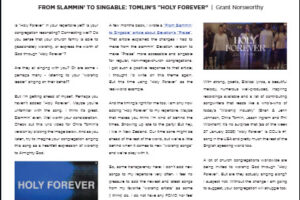Are we hoping to enthrall the viewing audience with a concert-like musical performance? Or are…
CHEAP WORSHIP AND COSTLY WORSHIP VLOG & BLOG
By Grant Norsworthy
Does it cost you anything to worship God? Is it expensive? Or is worship inexpensive? Or, rather than thinking there is any cost to worship at all, do you look at worship as a wonderful gift for you to enjoy with no significant cost? I explored these questions in this week’s vlog. Watch the video and, if it sparks your interest, please read this blogpost to go even deeper.
For most Christians, their worship is clearly defined in very specific terms: doing certain activities, in a particular place at a specific time each week. As we hear and imitate the way the word ‘worship’ is used in today’s Christian culture, it’s almost impossible NOT to think of my worship as being when I am gathered with other believers singing songs to and about God inside a church building on a Sunday morning. That’s the ‘how’, ‘where’ and ‘when’ of my worship of God, right? That would suggest that the rest of my week – well, pretty much – is mine to do with what I think is best.
What does that worship cost? A couple of hours of the 168 I have available to me each week? The effort required to be on time (or close enough to it) for the start of the service? The energy to sing alongwith the songs if I feel like it? Perhaps I could also see listening to the sermon and dropping a few bucks in the offering plate as other ways that I worship God. But if I consider everything I have (and all that I am) this ‘worship’ doesn’t really cost me much.
Let’s be honest. Most of us wouldn’t be there at all unless we were getting something from the ‘worship service’. Would I attend unless at least a few people I like were there too? If I found all the other people annoying and impossible to be around, wouldn’t I never go back? Would I show up each week if I never liked the preaching? If the music was not to my taste or up to my standards?
Most pastors are only too aware that they need to produce a “worship service” that “rings bells” if their congregation is to grow or at least be maintained. The emphases of the “worship service” are influenced (or even governed) by the need to give the congregation a positive “worship experience”. If they are fed the “worship experience” that they want – the rationale goes – they’ll come back next week and maybe bring their friends!
But my worship of God is not how I receive. From the beginning of creation, through the Old and New Covenants to this very day, worship has always been, and must always be about giving to God. The worship of God is to make a sacrifice in response to God’s glory. True worship is a one-way street from the created to The Creator!
God has already given Himself to us. My worship of God is in response to all that He is. This worshiper’s response should not – must not – be limited to just an hour or two on a Sunday morning while I am engaged in very specific activities of my own choosing. He gave Himself on The Cross to us. What is my response of worship to this overwhelming, gracious gift?
My deep concern is that we have turned even worship into another commodity that we, the people, decide if we like or not. We can hear Christians say thing like: “I love worship – especially Chris Tomlin” or, “Thank you pastor, worship was wonderful this morning” or, “I do not like the worship at XYZ church so I am going to find another church where I like the worship more.” We have made a form of worship of our own design – that suits us and our busy, consumerist lifestyles – when we ought only to worship God on His terms.
What are God’s terms for worship? We find the answer in The Bible.
During the Old Covenant (described in the Old Testament in The Bible) the worship of God usually took the form of a blood sacrifice of livestock – sheep, rams, cattle, oxen or other animals. Worship would cost me my very best and favorite farm assets! In fact, the second book of Samuel contains a fascinating story. We can read that King David travelled to a place to worship God by building an altar and making a livestock sacrifice, but he had not brought his own animals. He is met my a man named Araunah who offers to give King David all that he needs – a very generous gift – so that David could worship. And we read David’s response:
King David knew that true worship – worship that is acceptable to God – must cost him personally. No one else could pay on his behalf.
Now that we live in New Covenant times (described in the New Testament in The Bible) things are not so impractical, bloody and messy for us. In the New Covenant Jesus the Christ gave Himself on The Cross as the ultimate sacrifice. His sacrifice was made in my place. He bore the weight of my sin and the sin of all humanity. His sacrifice took away the need for any more blood being spilled as worship. Thankfully (on many levels) we don’t have to arrange for a family pet to die, or to buy a nice cow from a local farmer to worship God anymore.
[NOTE: To read Jesus speaking about the change in worship from Old to New Covenant, read John 4:1-45, especially verses 20 to 24.]
Yet sacrifice is still required of me. Jesus did not die on The Cross and rise from the dead so that I do not have to offer any sacrifice, or to allow me to offer only the sacrifice of my choosing. To think so is a cheapened form of worship. But what does this New Covenent, costly, sacrificial worship look like?
One of my heroes is Dietrich Bonhoeffer. He was part of the resistance movement in Germany during WWII and was executed only two weeks before the end of the war for resisting the Nazi regime and for being implicated in the June 1944 plot to assassinate Adolf Hitler. Ultimately, Dietrich Bonhoeffer’s worship of God included the loss of his physical life.
In 1936, he opened his book The Cost of Discipleship with these words:
“Cheap grace is the mortal enemy of our church. Our struggle today is for costly grace.”
I believe this statement is just as relevant for us today as it was in 1936. But I have changed one word to help us understand this statement a little better for our culture today:
Cheap WORSHIP is the mortal enemy of our church. Our struggle today is for costly WORSHIP.
Worship is our response to God’s grace. If we cheapen what it means to worship God, it shows that we undervalue the grace of God. This cheapening of God’s grace, shown by the cheapening of worship, is the most dangerous, deadly thing to the life and future of The Church. This is a big deal!
While I am reasonably confident that my worship of God won’t cost me my physical life any time soon as it did for Dietrich Bonhoeffer, I must see that true worship – the worship that God requires of the worshiper – still costs. And that cost is me. Just like Bonhoeffer, and just like Jesus, I must lose my “life”. The only appropriate gift to give God is myself – all of myself – in every moment of every day, no matter where I am and with everything that I do. As the old song says, “I [must] surrender all!”
It’s so easy for me to look at The Cross of Jesus and accept it as just a free gift. It IS a free gift but, paradoxically, this free gift costs everything. The Cross is a picture of what God has graciously done for me, but The Cross is also what is required of me.
Meeting as a community of believers is an important thing to do. Singing songs as one of the ways we worship God is potentially powerful and wonderful, but my life SURRENDERED IN WORSHIP – that is what is required.
And I believe that the most important, outward characteristic of the worshiper will be costly, self-sacrificial expressions of Christ’s love – especially towards the poor.
Read Matthew 25:31-46 – the judgment day story of the sheep and the goats.
And James 1:27 which states:
[SIDE NOTE: Most English Bible translations use the word “religion” in James 1:27, but I use the word “worship”. Why? Today, the word “religion” holds a great deal of negative connotation, even for people of the Christian faith. The word has changed in its meaning and usage over time. While it may have been true in the not-too-distant-past, Christians today tend not to think of themselves as “religious” but generally would see themselves as worshipers of God. So, in the hope of bringing greater clarity and a more relevant meaning, I use the word “worship” in place of the word “religion”. Today, I believe “worship” is a far better translation of the original text’s Greek word “thrēskeia”. Strongs Bible Concordance definition of the Greek “thrēskeia” supports this more helpful way of understanding James 1:27.]
Watch my short vlog that summarizes this blogpost HERE.


